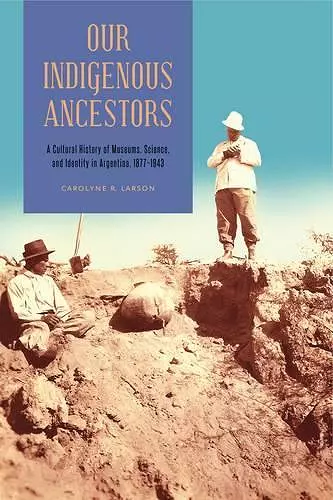Our Indigenous Ancestors
A Cultural History of Museums, Science, and Identity in Argentina, 1877–1943
Format:Hardback
Publisher:Pennsylvania State University Press
Published:31st Jul '15
Currently unavailable, and unfortunately no date known when it will be back
This hardback is available in another edition too:
- Paperback£30.95(9780271066974)

Our Indigenous Ancestors complicates the history of the erasure of native cultures and the perceived domination of white, European heritage in Argentina through a study of anthropology museums in the late nineteenth and early twentieth centuries. Carolyne Larson demonstrates how scientists, collectors, the press, and the public engaged with Argentina’s native American artifacts and remains (and sometimes living peoples) in the process of constructing an “authentic” national heritage. She explores the founding and functioning of three museums in Argentina, as well as the origins and consolidation of Argentine archaeology and the professional lives of a handful of dynamic curators and archaeologists, using these institutions and individuals as a window onto nation building, modernization, urban-rural tensions, and problems of race and ethnicity in turn-of-the-century Argentina. Museums and archaeology, she argues, allowed Argentine elites to build a modern national identity distinct from the country’s indigenous past, even as it rested on a celebrated, extinct version of that past. As Larson shows, contrary to widespread belief, elements of Argentina’s native American past were reshaped and integrated into the construction of Argentine national identity as white and European at the turn of the century. Our Indigenous Ancestors provides a unique look at the folklore movement, nation building, science, institutional change, and the divide between elite, scientific, and popular culture in Argentina and the Americas at a time of rapid, sweeping changes in Latin American culture and society.
“Carolyne Larson’s revealing of the indigenous foundation of liberal constructions of Argentine national identity is both startling and convincing. She does justice to the native peoples of Argentina and provides a historical context for current museum reforms and cultural repatriation efforts today. With clear and elegant writing supported by a remarkable depth and breadth of sources, Our Indigenous Ancestors is both a must-read for specialists and an accessible delight for the general reader.”
—Steven B. Bunker, University of Alabama
“In this well-researched and carefully written book, Carolyne Larson presents the formation and activities of three ‘ethnographic museums’ in belle epoque Argentina (in La Plata, Buenos Aires, and Tucumán) to explore the ways in which anthropologists and archaeologists placed the indigenous past—conceptualized as ‘deep antiquity’—at the service of various projects of national identity. Museum exhibits contributed to articulating notions of a creole Argentina that, while proud of its indigenous ancestry, put its relationship with living indigenous peoples at a comfortable distance. Tracing the complex interconnections between scientific discourse, museum practices, and national imaginings, Our Indigenous Ancestors succeeds in demonstrating the fascination of urban Argentines with the objects that represented that bygone indigenous past. A must-read for the serious student of modern Argentina.”
—Ricardo D. Salvatore, Florida International University
“This fascinating, deeply nuanced study complicates the commonly held notion that Argentina has imagined itself exclusively as an ethnically European nation. It makes a decisive contribution to our understanding of nation building and race in Latin America.”
—Christina Bueno, Northeastern Illinois University
“In dialogue with the current literature on the role of indigenous peoples in the evolution of the Argentine nation, Our Indigenous Ancestors makes a crucial contribution to our understanding of how a particular interpretation of Argentina's past was produced and consumed in the contradictory interaction between science and colonialism.”
—Florencia E. Mallon, University of Wisconsin–Madison
“Larson’s work will be useful for historians and other cultural studies scholars. While scholars of Argentina will likely be the target audience, those interested in museums and questions about indigenous identity and representation may also find useful information in the text. In the classroom especially, this study can be assigned by chapter to highlight competing ideas of identity and how national histories are shaped by multiple groups in scientific spaces that are hardly neutral.”
—Ryan Edwards Hispanic American Historical Review
“Larson’s excellent study underscores how a nation can both strategically embrace native cultures while simultaneously marginalizing and attempting to destroy them.”
—Christina Bueno Latin American Research Review
ISBN: 9780271066967
Dimensions: 229mm x 152mm x 23mm
Weight: 522g
232 pages